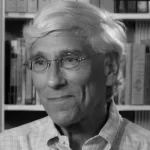Thursday, May 25 • – 3keynote speech
Jean-Luc Godard was haunted by cinema. In his early films, he reimagined genres that had burrowed into his thinking, as in the romantic melodrama Contempt, where ancient literature and a venerable filmmaker represent the tenacious shades of traditional narrative. The haunting takes a theological form in Hail Mary, where notions of the soul and the divine manifest Godard’s quasi-spiritual faith in painterly and cinematic images. And in Histoire(s) du cinema, he conjures up cinema’s ghostly lineage by means of images translated from the crisp materiality of film to the pliant inexactitude of video. These considerations point to hauntology as a useful tool for illuminating his oeuvre. As posited by Jacques Derrida, hauntology displaces ontology, figuring the spectre as an unfathomable intruder that is, in the words of philosopher Colin Davis, “neither present nor absent, neither dead nor alive,” a state resembling cinema’s dual nature, both immanently present and physically ungraspable. Another sense of the term, developed in psychoanalytic theory, emphasizes the phantom, the metaphorical presence of what Davis describes as “a dead ancestor in the living Ego, still intent on preventing its traumatic and usually shameful secrets from coming to light,” an entity pertinent to Godard’s fear of an “end of cinema” wrought by capitalist exploitation and political cowardice. Speculating along similar lines, Fredric Jameson has posited “spectrality” as an awareness “that the living present is scarcely as self-sufficient as it claims to be [and] that we would do well not to count on its density and solidity,” another concept resonating with Godard’s anxieties about cinema’s convoluted past, living present, and threatened future. In its radical reworking of film history, Godard’s project exemplifies Derrida’s idea of “an interpretation that transforms what it interprets.” Godard was haunted by cinema; cinema remains haunted by Godard.
David Sterritt is editor-in-chief of Quarterly Review of Film and Video and film professor at the Maryland Institute College of Art. His 15 books include The Films of Jean-Luc Godard: Seeing the Invisible and Jean-Luc Godard: Interviews.
